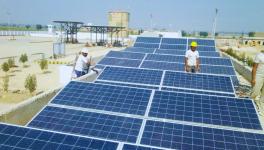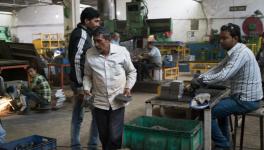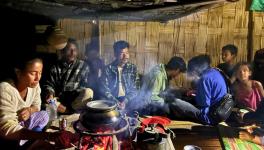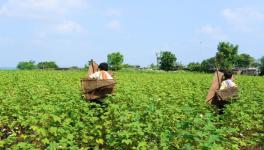Impacts of Climate Change Widening Gender gap, Worsening Inequalities
Patna: Women and girls are more vulnerable to climate change and its impacts, and their adaptive capacities are limited in South Asia and the Hindu Kush Himalaya (HKH) regions, as per a latest research report. Climate change is further widening the gender gap and worsening existing social inequalities due to women’s inadequate access to and control over productive resources, their limited mobility and voice in decision making, the report said.
According to the report, there is a need to mainstream gender into decision-making at all levels – from policy to practice to address this matter. This would open avenues for women to take charge and find the autonomy needed to work towards solutions that address the issues inherent in current socio-ecological systems. Ultimately, this would lead women to become pivotal agents in reducing their own vulnerabilities.
The impact of climate change can be seen in severe consequences such as increased food insecurity, poverty, and social and gender inequalities. These consequences are also the root causes of climate vulnerability in a vicious cycle. Reducing climate risks demands addressing these root causes. Understanding gender equality and social inclusion (GESI), among other issues, is central to comprehending people’s capacities to cope with and adapt to climate change-induced impacts, including recognising the prevalence of patriarchal systems in most South Asian and HKH countries, the report said.
The report entitled “State of gender equality and climate change in South Asia and the Hindu Kush Himalaya” was launched on September 29 (Thursday) in Kathmandu, Nepal. It analyses the gendered dimensions of climate change impacts in three key climate-affected sectors – agriculture, water, and energy – in ten countries of South Asia and the Hindu Kush Himalaya (HKH), including Afghanistan, Bangladesh, Bhutan, China, India, Maldives, Myanmar, Nepal, Pakistan, and Sri Lanka.
The report points out that policy documents reviewed for the research collectively reveal the commitment of South Asian and HKH countries to promoting gender equality through their constitutional mandates and their ratification of international instruments. However, the implementation of these policies and laws presents significant constraints.
“When it comes to linking and integrating gender concerns into climate policies and commitments, analysis has revealed that the uptake has been slow in the region. Although climate change is a central agenda for most governments in their planning and policies, the focus on gender has not been given due attention and has remained unclear so far.” It said that most national policy documents examined in the report showed a lack of explicit provisions for addressing the specific vulnerabilities faced by women across sectors and the inequalities resulting from prevailing norms, roles, and relations. “While there are good examples related to GESI policy and implementation from South Asia and the HKH, they are few and far between,” the report added.
The Kathmandu-based International Centre for Integrated Mountain Development (ICIMOD), in collaboration with UN Women and UN Environment Programme (UNEP), prepared the assessment report under the ‘EmPower – Women for Climate Resilient Societies’ project jointly implemented by UN Women and UNEP and funded by the Swedish International Development Cooperation Agency (Sida).
In the agriculture sector, the report found that climate change has led to an increase in the outmigration of younger, able-bodied men in search of better livelihood options and employment. Women, children, and the elderly are left behind, increasing the feminisation of agricultural labour and adversely affecting agricultural production, particularly in the mountain areas of HKH countries like China, India, Nepal, and Pakistan. In the border areas, women are engaged in the informal trade of agricultural products and inputs (CUTS International 2018, 2021). Although the volume of trade is significant, its informal nature means that there are no regional or national policy measures to safeguard these women traders.
“Given its importance, all the countries of the HKH and South Asia have numerous policy documents focusing on agriculture. While these national agricultural policies recognise the vital role of women in the sector, most of them are silent on the persistent pay gap between women and men, and on the issue of women’s lack of or limited access to and control over the resources necessary for agricultural activities.” the report said.
The report also revealed that women are still not recognised as farmers, and as such, they are excluded from decision-making within water institutions. For instance, women are not recognised in the policies on groundwater or irrigation as these are tied to land rights, which men hold.
The report has given recommendations, including short, medium, and long-term actions, to address GESI concerns effectively and reduce the differential vulnerabilities of various groups of women and men in the face of a changing climate.
Some of the recommendations include the formulation of mechanisms to ensure the maintenance of gender-disaggregated data, GESI-sensitive assessments, and monitoring and evaluating interventions in the agriculture, energy, and water sectors to improve the effectiveness of policies for achieving gender and social equality. It also recommends guaranteeing meaningful participation of women’s networks and marginalised groups in policy dialogues and the development of climate-related interventions in these sectors in the short term. Implement gender-responsive budgeting and gender audits to ensure that GESI issues are reflected in all stages and phases of development programmes.
Climate change is a global emergency that reaches beyond national borders and impacts both human and natural systems. Rising temperatures, changes in precipitation patterns, and increased hazards have clear and severe impacts on the poorest and most marginalised communities, further compounding social and gender inequalities.
South Asia and the HKH are among the regions most vulnerable to the impacts of climate change. Its adverse effects are worsening and becoming more evident here. About 40% of all global climate-related disasters occur in South Asia and the HKH, which have geologically fragile areas such as mountains and coastal floodplains vulnerable to erosion, landslides, floods, drought, and saline intrusion. The HKH, in particular, faces high rates of glacier melt, erratic precipitation patterns, and increased incidences of floods and dry spells.
Get the latest reports & analysis with people's perspective on Protests, movements & deep analytical videos, discussions of the current affairs in your Telegram app. Subscribe to NewsClick's Telegram channel & get Real-Time updates on stories, as they get published on our website.
























